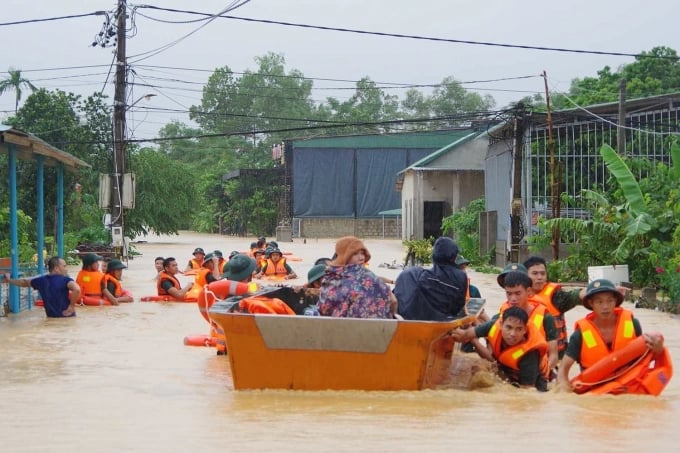June 19, 2025 | 00:33 GMT +7
June 19, 2025 | 00:33 GMT +7
Hotline: 0913.378.918
June 19, 2025 | 00:33 GMT +7
Hotline: 0913.378.918
Recently, at the second National Press Awards for Disaster Risk Management with the theme "For a Society Safe from Disasters - Proactively Adapting to Climate Change," Ms. Caitlin Wiesen, United Nations Development Programme Resident Representative, lauded the commitment and contribution of press agencies to the mission of natural risk prevention and combat.

Ms. Caitlin Wiesen, United Nations Development Programme Resident Representative. Photo: Pham Hieu.
According to Ms. Wiesen, in addition to the persistent efforts made by the Government and the People of Viet Nam, as well as the media, for their proactive and effective actions to reduce risks of disasters and climate change with a focus on building the resilience of the most marginalized and vulnerable groups living in hazard-prone areas such as coastal regions, the Central Highlands, and the Mekong Delta.
With the contribution of Vietnamese journalists, reporters, and collaborators to the distribution of vital information, people will be equipped with the knowledge essential to protect themselves, their homes, and their livelihoods from dangers and disasters associated with climate change.
“At this time, I would like to recognize and express appreciation for the tremendous contributions of the mass media agencies, reporters, and collaborators to disaster risk management across Viet Nam. The media plays a critically significant role in all phases of disaster risk management, including disaster preparedness, response, and recovery; they provide timely, accurate, and up-to-date information that reflects the real situation on the ground.”, said Ms. Wiesen.
She noted that it provides practical assistance for risk reduction activities throughout Vietnam, allowing leaders at all levels to make accurate choices and the people to ensure a prompt reaction, which has helped to decreasing the negative effects of natural disasters.
The incidence of extreme weather is growing in Vietnam, and the occurrence of natural catastrophes is also characterized by several aberrant, even atypical, unpredictability elements. According to data from the project summary "Green Climate Fund (GCF): Increased resilience of vulnerable coastal communities to climate change-related impacts in Vietnam", there have been 226 extreme weather events over the past 20 years, killing an average of 226 people per year and causing approximately USD 2 billion in annual damages.

There have been 226 extreme weather events over the past 20 years.
The government has issued and is currently executing a variety of essential legal programs and tools. This includes the Law on Disaster Prevention 2020, the Community-Based Disaster Risk Management (CBDRM) Program, which was first activated in 2009 and repeated in 2020 with new content relevant to the current period of 2021-2030, the Program on flood-resistant houses, and the recent Decree No. 28/2022/ND-CP on preferential credit policies for implementation of the National Target Program on socio-economic development in ethnic minority and mountainous areas for the period of 2021-2030, among others.
Besides the urgent concrete actions of both the political system and the people in promoting disaster risk management and improving resilience, the media also plays its role. Communication programs with the participation and initiative of ministries, sectors, and international organizations, including UNDP, have generated a certain effect and influence in raising awareness and disseminating to the people issues related to natural disasters such as the National Press Award for Disaster Risk Management, the program of Searching for Media Creativity on Disaster Impact Reduction and Climate Change.
In a joint effort to address climate change, the United Nations Development Program (UNDP) has implemented many projects and programs to help Vietnam in the field of disaster prevention. The United Nations Development Programme (UNDP) has approved the Country Programme Document for Vietnam for the period 2022-2026, with a financial support package of more than USD 129 million for many areas, including strengthening resilience to natural disasters and sustainable environmental development.
Translated by Linh Linh

(VAN) According to the Binh Thuan Department of Industry and Trade, in the first five months of 2025, Binh Thuan's dragon fruit export turnover increased by 20.65% compared to the same period last year.

(VAN) EU countries on Thursday gave final approval to new tariffs on fertilizer imports from Russia, a move aimed at cutting off revenue that could support Moscow’s war in Ukraine, despite concerns from European farmers.

(VAN) The working delegation from the Ministry of Agriculture and Environment conducted an important trip to the Netherlands to strengthen strategic partnerships and sustainable development in the agricultural sector.

(VAN) The letter ‘A Plea from the Ocean’ not only evokes emotion but also awakens the human conscience to the responsibility of protecting life on Earth.

(VAN) The Department of Agriculture in South Africa has announced the country’s first mass vaccination of poultry to prevent local birds from contracting avian influenza.

(VAN) Establishment of the Mekong Delta Regional Agricultural Linkage Center, aiming for a closed value chain, deep processing, trading platforms, and international market connectivity.

(VAN) Gia Lai province has recently recorded 460 rare species of animals and plants, contributing to forest conservation and biodiversity planning in the region.